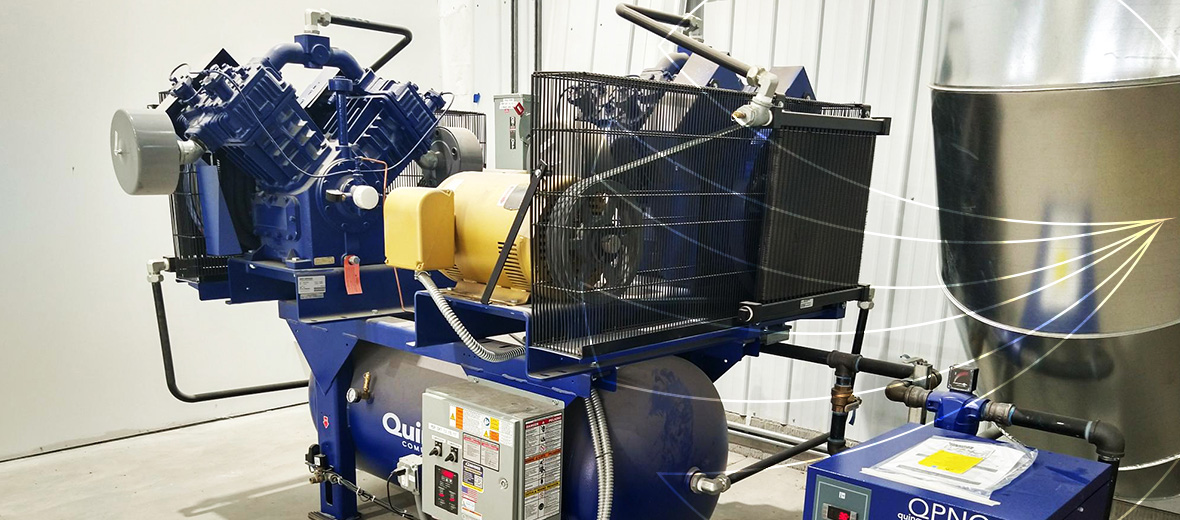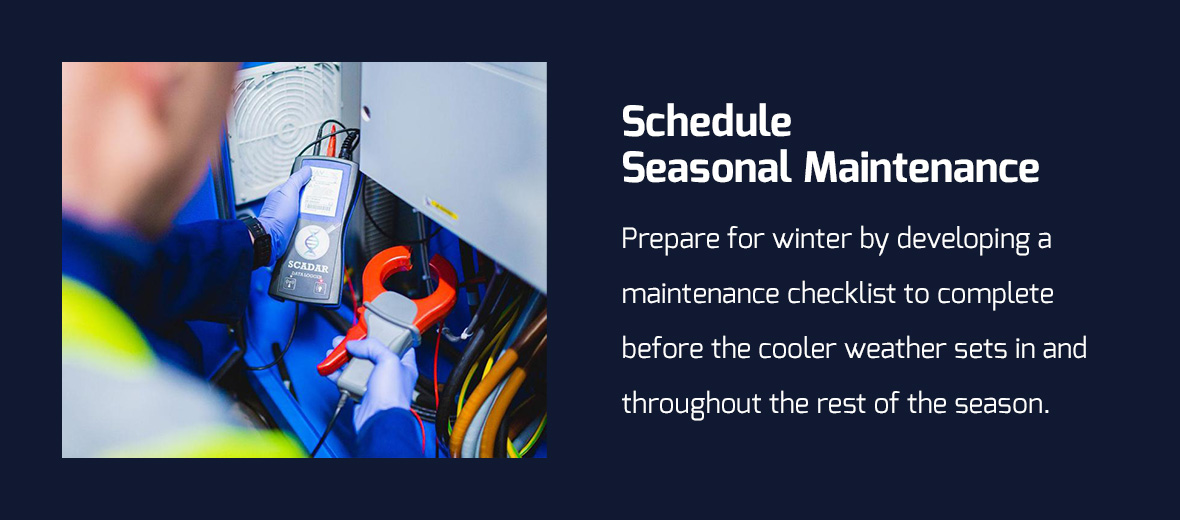November 15, 2019
How to Winterize Your Air Compressor
SHARE THIS POST

You rely on your air compressor system to deliver consistent, predictable performance throughout the year — winterization is critical to ensuring you get that ongoing performance and reliability throughout winter. Your industrial air compressor needs additional care and maintenance going into the colder months to protect it against winter weather and frigid temperatures.
Take preventive measures to protect your investment with these winterization tips. As you get your air compressor ready for the cold season, you can keep your operations running smoothly.
Why Should You Winterize Your Air Compressor?
Preparing your air compressor for cold temperatures is crucial to maintaining its efficiency and performance. Winterization enables you to:
- Prevent freezing: Several air compressor components contain water vapor that can freeze in cold temperatures, so winterization is key to protecting your equipment and preventing damage.
- Minimize downtime: Preparing your air compressor for winter ensures it can perform consistently and efficiently with minimal damage, operating issues or downtime.
- Reduce damage risks: As you drain away water and protect your air compressor against winter weather, you can reduce damage and costly repair risks due to rust and corrosion.
- Increase cost savings: You can reduce overhead expenses and decrease utility bills as you take the time to prepare your air compressor for cold temperatures.
How to Winterize an Air Compressor
The following tips can help you proactively protect your compressor from cold temperatures, winter weather and costly repairs.
1. Insulate Your Air Compressor
Insulating your air compressor enables you to maintain stable internal temperatures and protect your equipment and operations. Exposed air piping has the potential to form condensate in cold weather, which could lead to freezing and pipe failure. With proper insulation, the pipes can keep compressed air warm for optimal system performance.
You can also insulate and protect your air compressor with heating tape, blankets, foam, protective covers or shelters that block snow and ice. When building an enclosure around your outdoor air compressor, be sure to include proper ventilation to prevent heat buildup.
2. Drain Your Compressor Regularly
Preventing moisture buildup is one of the most critical steps to preparing your air compressor for winter. You must drain all moisture from your system to prevent internal and external freezing damage, such as burst pipes or tank failure. Ensuring the system is completely drained also helps minimize rust and corrosion.
Each day, open the drain valve and let the tank drain completely. You should also manage and maintain your drainage system by:
- Inspecting your tanks a few times a week for condensation buildup.
- Investing in an automatic drain valve.
- Ensuring all drains are functioning properly.
- Cleaning the drainage system to avoid blockages.
- Using a moisture separator to eliminate condensate.
- Monitoring equipment for sudden moisture increases.
3. Install Appropriate Dryers
Another way to prevent condensation buildup is to use dryers within your tank. Desiccant dryers can actively help remove moisture from your compressed air system to:
- Prevent rust and corrosion.
- Reduce risks of freezing.
- Minimize moisture running through pipes.
Moisture separators and automatic drain valves are also beneficial tools that help you decrease condensation buildup and the risks that come with it.
4. Store Properly
Storing your air compressor indoors is ideal, especially when you are not using it. A climate-controlled environment lets you maintain above-freezing temperatures to protect your air compressor and ensure it is ready to use when you need it again. Store your compressor in a secure, warm and dry place to prevent water damage, rust and freezing. Be sure to disconnect and drain tanks and hoses.
If indoor storage is not possible, you can implement several safety measures to keep your air compressor secure outdoors. Maintaining a proper temperature is vital to avoiding cold starts, which can put additional strain on your compressor’s motor. Protect your air compressor and keep it warm by:
- Placing heaters nearby.
- Insulating exposed piping and drain valves with heating tape.
- Using moisture separators.
- Building a shelter to protect against snow, rain and hail.
- Covering the compressor with blankets, weather-resistant covers or tarps.

5. Schedule Seasonal Maintenance
Adhering to the manufacturer’s maintenance schedule and conducting regular inspections throughout the year ensure your air compressor is ready to operate in any condition, especially during the colder months. Prepare for winter by developing a maintenance checklist to complete before the cooler weather sets in and throughout the rest of the season. Your checklist should include:
- Cleaning air intake filters and compressor components.
- Replacing frayed, cracked or damaged belts and hoses.
- Adjusting louvers to recirculate heat and use it more effectively.
- Repairing any leaks in air lines, fittings or connections.
- Checking weatherstripping to ensure sufficient insulation.
- Scheduling routine professional preventive maintenance services.
6. Adjust Power Settings
Dense, cold winter air can make your air compressor work harder and less efficiently. Adjust power settings by lowering maximum pressure settings to compensate for the air changes. You can also improve efficiency and energy usage by minimizing the chances of freezing. Protect air compressor operation by:
- Repairing leaks.
- Using heating tape.
- Insulating control lines.
- Draining condensate regularly.
- Checking for ice buildup.
- Maintaining a controlled indoor temperature.
- Cleaning air filters.
If you use an oil-flooded air compressor, monitoring oil quality can help reduce power consumption. Oil will become thicker in the winter, reducing its lubrication capabilities. The more viscous your oil is, the more power your compressor pump needs to operate and the more strain the whole drive train will experience. Consider switching to a winter-grade lubricant to ensure smooth operation and less power demand.
FAQs About Air Compressor Winterization
Read on for quick answers to the most common air compressor winterization questions.
Do You Need to Winterize an Air Compressor?
Yes, winterizing your air compressor is critical for its longevity and optimal performance.
How Do I Keep My Air Compressor From Freezing?
You can prevent freezing by ensuring your air compressor is free from moisture. Maintain functionality throughout the winter by:
- Draining your compressor tank regularly.
- Implementing dryers.
- Installing an automatic drain valve.
- Storing your air compressor in a warm room.
- Protecting an outdoor air compressor from weather and cold temperatures.
How Do You Store an Air Compressor in the Winter?
Store your air compressor inside a climate-controlled room for the winter. The room should be warm and dry to prevent moisture buildup or freezing. If you must keep your air compressor outside, keep it warm and secure with weather-resistant coverings, heating tape and heaters.
Contact C.H. Reed for All Your Compressed Air Needs
When winter starts to set in, know that you have a trusted partner in C.H. Reed. We support your industrial air compressor maintenance and winterization efforts, helping you prepare your system for colder temperatures and winter storms. In addition to our full range of maintenance services, we offer an extensive catalog of compressed air equipment to ensure you find the right solutions for your specific needs.
Contact us today to schedule a complete system analysis!
Search
Categories
Get a consultation
Related Posts
The 3 Distinct Advantages of Hydraulic Powered Pumps
Recently, C. H. Reed helped a major printing operation install a new ink pumping system. The new system needed to transfer four colors of high viscosity, heat-set ink to their three presses, drawing the ink from multiple 5,000…
Simple Ways to Reduce Waste in Your Spray Finishing System
In today’s demanding manufacturing landscape, it can be convenient to adopt a “cut-costs-at-all-costs” mentality, justifying questionable means for the sake of leaner production, a lower bottom line and increased profitability. Regrettably, those efforts can interfere…
What You Need to Know About Air-Powered Pressure Washers
Pressure washers are great solutions for your average cleaning applications, but what tool do you turn to for your more challenging applications? There are many instances where it is simply impossible to use a traditional…
